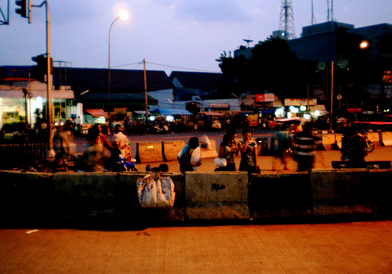Prokem, bahasa gaul, language inventiveness
February 17, 2008, [MD]
 One of the problems I had when learning Indonesian in Jakarta was that what
people actually spoke seemed to be very distinct from what was in my
textbooks (never mind that my textbooks were also about 20 years old,
but most importantly they taught a very refined Indonesian. I remember
on the title page was the admonition: “Bicara bahasa Indonesia yang
baik dan benar”, speak correct Indonesian). I eventually realized that
what the young people in the office were speaking was called “bahasa
gaul”, a kind of youth slang that was both grammatically and
morphologically quite different (although mostly in consistent ways)
with standard Indonesian. Apparently it was related both to Betawi - the
dialect of the “original” Jakartans (Jakarta being a melting pot of all
ethnicities from the archipelago), Chinese - especially Hokkien words,
and probably vocabulary both from prison/drug environments, and gay and
transvestite culture.
One of the problems I had when learning Indonesian in Jakarta was that what
people actually spoke seemed to be very distinct from what was in my
textbooks (never mind that my textbooks were also about 20 years old,
but most importantly they taught a very refined Indonesian. I remember
on the title page was the admonition: “Bicara bahasa Indonesia yang
baik dan benar”, speak correct Indonesian). I eventually realized that
what the young people in the office were speaking was called “bahasa
gaul”, a kind of youth slang that was both grammatically and
morphologically quite different (although mostly in consistent ways)
with standard Indonesian. Apparently it was related both to Betawi - the
dialect of the “original” Jakartans (Jakarta being a melting pot of all
ethnicities from the archipelago), Chinese - especially Hokkien words,
and probably vocabulary both from prison/drug environments, and gay and
transvestite culture.
This sociolect is of course in constant development - it might have started as something very local to a small group in Jakarta and other big cities, and then spread through the opening up of TV and radio, and later to be used in youth novels to make them more “realistic” (which meant that I could not at all understand the direct speech, and sometimes the entire contents, of youth novels until late in my language learning process). Now it is also being adopted by advertising posters and traditional media as “cool”. And interestingly almost all blogs and mailing lists are written in this style - which does not have a standardized spelling, making it hard sometimes to google for things.
There are several elements, and I won’t try to give a full account. There are lot’s of words that might come from Hokkien, Javanese or Sundanese or other local languages, English or Dutch (but often with a different, related meaning), or Indonesian that is transformed. For example cewek and cowok for girl (Bhs Indo: perempuan and laki-laki), nyokap and bokap for mum and dad (Bhs Indo: ibu and bapak - which are also used as honorifics). Then there is the different “conjugations”, where for example the suffix -kan, used to make a verb transitive, becomes -in, and the initial meng/men/meny (depending on the following letter), also a prefix for transitive verbs, become ng-, ny-. So mengapakan (the transitive form of “what” = “what are you doing”) becomes ngapain (a common question - what’s up?).
I also noticed that Indonesians seemed to have a very playful relationship with their language, and love to create new words - very often based by syllable abbreviations (that remind me of Russian komsomol style abbreviations). I don’t know how far back in time this goes, but it is not at all confined to slang - the department of education has Depdiknas written with large letters on its building (Departemen Pendidikan Nasional) - a good example of how it seems quite random which syllables are chosen. (My boss in Jakarta complained about gakin- keluarga* mis*kin** - poor families). But this is also used a lot in youth cultures (and not just adolescent - people I worked with at the office delighted in making up new ones, and using them).
All this to say that I just came across a very interesting article about bahasa prokem (apparently prokem is derived from preman - the small crooks that control territories in Jakarta and demand protection money, etc - a word derived from the Dutch vrijman), a kind of precursor to the current bahasa gaul (gaul means something like social, mixing - has connotations with naughty, and the term pergaulan bebas which means free sex) from around the 1980s. He gives lot’s of examples, and although most of it is much more radical than what I have been hearing (although it might still live on in parts of the population that I have not frequented), it’s fun to see the origins of some words that are now largely accepted parts of casual speech, like bokap and nyokap.
“Those who speak Prokem”, by Henri Chambert-Loir.
PS: This blog post is also an example of the power of open access publishing - I would not have bothered blogging about this article, if it had not been available for free download, since presumably most readers either a) don’t have access to institutional article databases, and b) even if they had, wouldn’t bother searching up this article, but want a direct link.
PPS: I took the picture at night in Pasar Senen, which certainly has enough preman and anak2 nongkrong.
Stian Håklev February 17, 2008 Toronto, Canada comments powered by Disqus